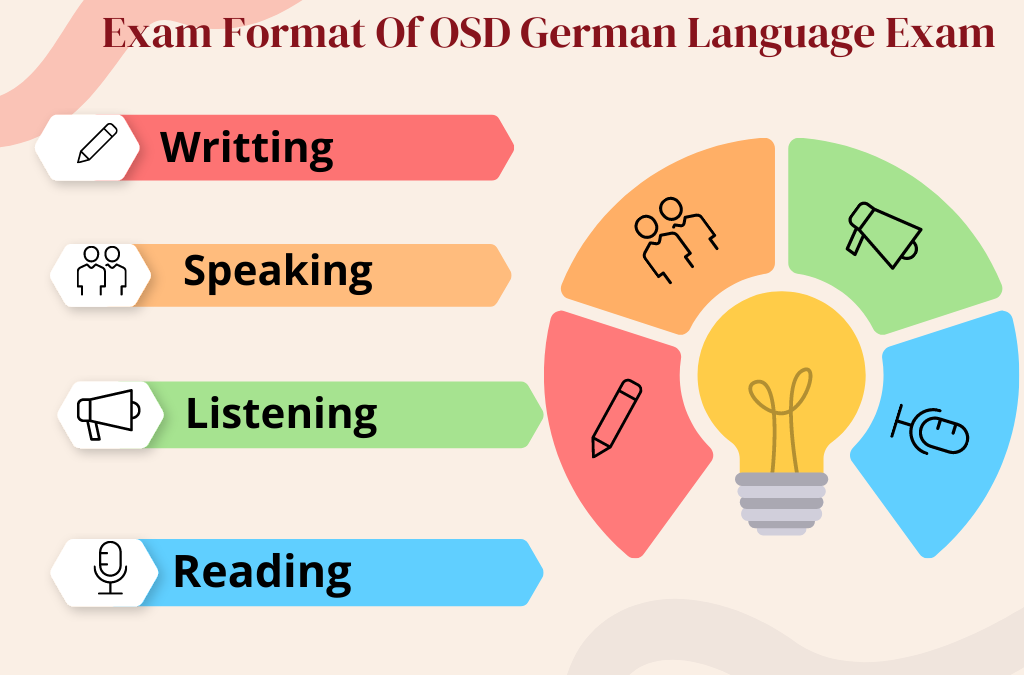OSD German language exam preparation: The OSD German Language exam is a standardized language proficiency test for non-native speakers of German. It assesses a candidate’s ability to use the German language in various situations, such as reading, writing, listening, and speaking.
Overview of the OSD German Language Exam
Are you interested in taking the OSD German Language Exam but don’t know where to start? Look no further! In this article, we will provide you with an overview of the exam and its content.
The OSD German Language Exam, also known as the “German Language Diploma,” is a standardized test that assesses your proficiency in the German language. It is recognized by many universities and employers in Germany and other German-speaking countries.
The exam consists of four parts: listening, reading, writing, and speaking. Each part is designed to test your ability to understand and communicate in German.
In the listening section, you will listen to audio recordings and answer questions based on what you hear. The reading section tests your comprehension of written German, while the writing section assesses your ability to write in German. Finally, the speaking section evaluates your ability to speak German fluently and accurately.
To prepare for the exam, it is recommended that you practice all four skills regularly. You can find practice materials online or through language schools and tutors
The OSD German Language Exam is a valuable certification for anyone wishing to study or work in a German-speaking country. By familiarizing yourself with the exam’s content and practicing regularly, you can increase your chances of success.
When preparing for an OSD German language exam, it’s essential to cover the following four main headings:





Eligibility and Format of the OSD German Language Exam
Eligibility and Format of the OSD German Language Exam: A Comprehensive Guide
The OnDaF (OSD) German language exam is a standardized test that evaluates the language proficiency of non-native speakers of German. It is recognized by various institutions, including universities and employers, as proof of language proficiency. This article aims to provide you with a comprehensive guide to the eligibility and format of the OSD German language exam.
Eligibility Criteria
To be eligible to take the OSD German language exam, you must meet the following criteria:
1. You are not a native speaker of German
2. You have completed at least 400 hours of German language instruction or have equivalent knowledge
3. You are at least 16 years old
If you meet these criteria, you can register for the OSD German language exam.

Exam Format
The OSD German language exam consists of four parts: listening, reading, writing, and speaking. Each part evaluates a specific language skill and has a different format.
The IELTS test consists of four sections: Listening, Reading, Writing, and Speaking. The Listening section has four parts and requires you to answer multiple-choice questions based on audio recordings. The Reading section has five parts and requires you to answer multiple-choice questions based on texts. The Writing section has two parts and requires you to write short texts on given topics, such as a letter or essay. The Speaking section has three parts and requires you to have a conversation with an examiner about topics such as your interests, describing a picture or graph, and discussing a given topic.
Each part of the exam is scored separately, and your overall score is calculated based on your performance in all four parts.
The OSD German language exam is an excellent way to prove your German language proficiency to universities and employers. To be eligible for the exam, you must have completed at least 400 hours of German language instruction or have equivalent knowledge. The exam consists of four parts: listening, reading, writing, and speaking. Each part evaluates a specific language skill and has a different format. By understanding the eligibility criteria and exam format, you can prepare yourself for success in the OSD German language exam.
Who can take the OSD German language exam?
Are you a non-native speaker of German looking to work in the healthcare sector in Germany? If so, you may be interested in the OSD (Zertifikat Deutsch / telc Deutsch B1-B2 Pflege) language exam.
Designed specifically for healthcare professionals such as doctors, nurses, and caregivers, the OSD exam assesses language proficiency in German at the B1 level or higher according to the Common European Framework of Reference for Languages (CEFR).
But don’t worry if you’re not a healthcare professional – anyone can take the exam as long as they meet the language proficiency requirements. And with a passing score, you’ll have a valuable certification that can help you stand out to potential employers in the healthcare industry.
So why should you consider taking the OSD exam? For one, it can demonstrate to employers that you have the language skills necessary to communicate effectively with patients and colleagues in a healthcare setting. Additionally, it can help you feel more confident and comfortable navigating the German healthcare system..
What is the format of the OSD German language exam?
The format of the OSD German language exam varies depending on the level being tested. There are three levels of the OSD exam: A2, B1, and B2.
– For the A2 level, the exam consists of four parts: reading comprehension, listening comprehension, writing, and speaking.
– For the B1 level, the exam also consists of four parts: reading comprehension, listening comprehension, writing, and speaking. However, the writing section includes an additional task where the candidate is required to write a letter or email.
– For the B2 level, the exam consists of five parts: reading comprehension, listening comprehension, writing, speaking, and project work. The project work involves researching and presenting a topic related to German culture or society.
Overall, the OSD German language exam assesses a candidate’s ability to communicate effectively in German in various contexts and situations.



Recent Comments